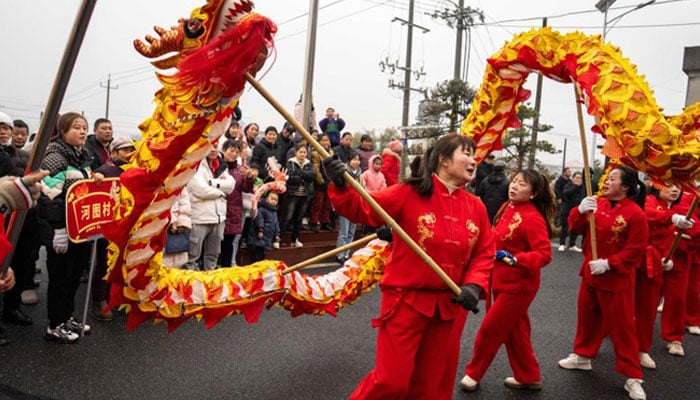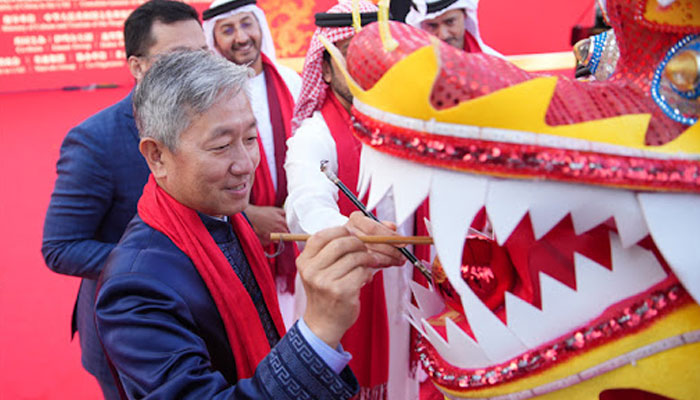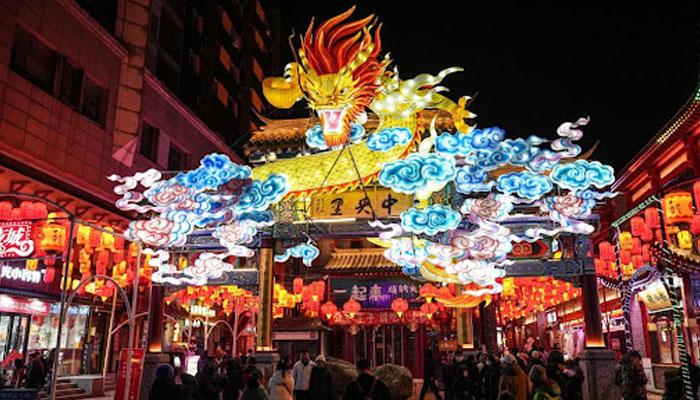The year of the dragon
Chinese New Year, also known as Spring Festival, falls on first day of first month of Chinese lunar calendar and is most important festival in China
Chinese New Year is the oldest and grandest festival of the Chinese nation, with the most bustling and exciting time across China. This year marks the most auspicious year of the dragon, or ‘loong’, in the Chinese zodiac.
Throughout history, the loong has gradually gathered rich cultural connotations and auspicious meanings, representing strength and wisdom. The year of the loong is believed to be a year full of hope and good fortune.
During the New Year season, with every household immersed in the festive atmosphere, people engage in a variety of colourful cultural activities, experiencing the essence of the new year, building stronger cultural confidence, and consolidating their aspirations for a better life.
Chinese New Year, also known as the Spring Festival, falls on the first day of the first month of the Chinese lunar calendar and is the most important festival in China.
On the eve of Chinese New Year, every household would paste red couplets, set off fireworks and firecrackers, keep their homes brightly lit to ward off evil spirits, and welcome the new year. In the early morning of the new year, people usually visit relatives and friends to exchange blessings and good wishes.
These customs have been passed down through generations for thousands of years, shaping the modern celebration of Chinese New Year. People also set aside their busy schedules and travel back home to reunite with their families during the new year holidays.
Gathered around the dinner tables, families enjoy a sumptuous new year’s eve feast, exchanging stories and reminiscing about the past year’s joys and achievements, pray for peace, prosperity, and happiness in the coming year.
In recent years, with rapid economic and social development, the traditional ways of celebrating Chinese New Year could no longer satisfy people’s appetite. Instead, activities such as travelling, shopping, and going to the cinemas during the new year holidays have evolved into new customs, reflecting the development and changes in Chinese society and showcasing a new atmosphere of Chinese modernization.
Data shows that during the 2024 Chinese New Year holidays (February 10-17), the total cross-regional mobility of people in China reached 2.293 billion. Driven by various favourable factors such as policies, supply and promotion, the willingness of urban and rural residents to travel surged, with the number of travellers and total expenditure creating new historical records.
According to calculations by the Ministry of Culture and Tourism of China, during the eight-day holidays, domestic tourists reached 474 million, with a year-on-year increase of 34.3 per cent. The total domestic tourism expenditure amounted to 632.687 billion yuan (RMB), a year-on-year increase of 47.3 per cent. At the same time, travel abroad was in full swing.
With the continuous expansion of China’s ‘visa-free circle of friends’, cross-border tourists once again made Chinese New Year a peak season for global tourism. China witnessed approximately 6.83 million cross-border tourists during the holiday period, with about 3.6 million outbound tourists and 3.23 million inbound tourists. The combination of returning home for family reunions and leisure vacations triggered a new wave of travel consumption.
Business was as usual during Chinese New Year. Whether on e-commerce platforms or in offline markets, people’s enthusiasm for purchasing new year goods continues to soar. As of February 17, 2024, the total online retail sales during the ‘Online Shopping Festival’ reached approximately 1.2 trillion yuan, with a nearly 9.0 per cent daily increase compared to the previous year.
On new year’s eve, sales at some major hypermarkets in China increased by about 20 per cent compared to the previous year. Sales of sugar-free pastries, healthcare gift boxes, and low-fat snacks have seen rapid growth, while green products and services such as energy-saving home appliances and low-carbon transportation were highly sought after.
Goods with rich Chinese traditional cultural features as well as reflecting national style and charm have become the ‘new favourites’ in the market. People’s pursuit of commodities increasingly focuses on green, health, technological intelligence, and cultural characteristics.
In addition to the sumptuous new year’s eve dinner, a series of cultural feasts have made Chinese New Year atmosphere richer and more vibrant. The total box office of movies during this New Year season exceeded 8 billion yuan, setting a new record in China’s film history and marking a blockbuster start for the film market.
According to preliminary statistics, there were approximately 150,000 mass cultural activities held nationwide during Chinese New Year, including village gala performances, rural opera shows, new year painting shows, and Lunar New Year celebrations in libraries, with a total participation of about 669 million both online and offline.
Nowadays, the significance of Chinese New Year is no longer confined to China alone. Celebrations of Chinese New Year have gradually spread from China to the world, allowing people worldwide to join in the vibrant and colourful celebration of Chinese culture. On December 22, 2023, the 78th UN General Assembly unanimously passed a resolution designating Chinese New Year as a UN holiday.
During this Chinese New Year period, diverse celebrations took place around the globe. Before Chinese new year’s eve, the New Year Light Show appeared for the fifth consecutive year at the world’s tallest building, the Burj Khalifa in Dubai, and the ‘Warmly Welcoming Spring, Joyful Chinese New Year’ parade also took place in Dubai.
In Poland, the National Philharmonic hosted the 2024 Chinese New Year Concert, receiving numerous standing ovations from the audience. In Venice, Italy, festivities were held in St Mark’s Square to celebrate Chinese New Year, featuring traditional Chinese fashion shows, lion and dragon dances, and fan dances, among other performances.
Chinese New Year is not only a festival of family reunion and joy but also an important medium to convey the concepts of peace and harmony. As Chinese New Year spreads worldwide, it serves as a vivid manifestation of the exchanges, mutual learning, and upholding the beauty of different civilizations.
Chinese New Year customs keep evolving, always incorporating new elements while retaining heartfelt traditions. The New Year customs have made the Chinese understand happiness more clearly and comprehensively. While the ways of celebrating the new year may change, the cultural and emotional significance of Chinese New Year remains unchanged for the Chinese.
The feelings of kinship and nostalgia as well as the consolation and hope that the festivals condense are still genuine and warm. With these culturally significant rituals, we capture the deep-seated dynamics of Chinese civilization and the relentless pursuit of a better and happier life by the Chinese and people around the world.
The writer is the consul-general of China in Karachi.
-
 Daniel Radcliffe Admits To Being Self Conscious While Filming 'Harry Potter' In Late Teens
Daniel Radcliffe Admits To Being Self Conscious While Filming 'Harry Potter' In Late Teens -
 Director Beth De Araujo Alludes To Andrew's Arrest During Child Trauma Talk
Director Beth De Araujo Alludes To Andrew's Arrest During Child Trauma Talk -
 Video Of Andrew 'consoling' Eugenie Resurfaces After Release From Police Custody
Video Of Andrew 'consoling' Eugenie Resurfaces After Release From Police Custody -
 'Harry Potter' Alum Daniel Radcliffe Gushes About Unique Work Ethic Of Late Co Star Michael Gambon
'Harry Potter' Alum Daniel Radcliffe Gushes About Unique Work Ethic Of Late Co Star Michael Gambon -
 Japan: PM Takaichi Flags China ‘Coercion,’ Pledges Defence Security Overhaul
Japan: PM Takaichi Flags China ‘Coercion,’ Pledges Defence Security Overhaul -
 Angorie Rice Spills The Beans On Major Details From Season 2 Of ' The Last Thing He Told Me'
Angorie Rice Spills The Beans On Major Details From Season 2 Of ' The Last Thing He Told Me' -
 Questions Raised Over Andrew Mountbatten-Windsor's Line Of Succession
Questions Raised Over Andrew Mountbatten-Windsor's Line Of Succession -
 'Shameless' Sarah Ferguson 'pressuring' Princess Eugenie, Beatrice For Major Reason
'Shameless' Sarah Ferguson 'pressuring' Princess Eugenie, Beatrice For Major Reason -
 Teacher Arrested After Confessing To Cocaine Use During Classes
Teacher Arrested After Confessing To Cocaine Use During Classes -
 Paul McCartney Talks 'very Emotional' Footage Of Late Wife Linda In New Doc
Paul McCartney Talks 'very Emotional' Footage Of Late Wife Linda In New Doc -
 Princess Beatrice, Princess Eugenie's Response To Andrew's Arrest Revealed
Princess Beatrice, Princess Eugenie's Response To Andrew's Arrest Revealed -
 King Charles And Princess Anne Bestow Honours At Windsor Castle
King Charles And Princess Anne Bestow Honours At Windsor Castle -
 King Charles 'worried' As Buckingham Palace, Royal Family Facing 'biggest Crisis'
King Charles 'worried' As Buckingham Palace, Royal Family Facing 'biggest Crisis' -
 Milo Ventimiglia Recalls First Meeting With Arielle Kebbel On The Sets Of 'Gilmore Girls' Amid New Project
Milo Ventimiglia Recalls First Meeting With Arielle Kebbel On The Sets Of 'Gilmore Girls' Amid New Project -
 Eric Dane Infuriated After ALS Diagnosis As He Feared The Disease Would Take Him Away From His Girls
Eric Dane Infuriated After ALS Diagnosis As He Feared The Disease Would Take Him Away From His Girls -
 It's A Boy! Luke Combs, Wife Nicole Welcome Third Child
It's A Boy! Luke Combs, Wife Nicole Welcome Third Child






